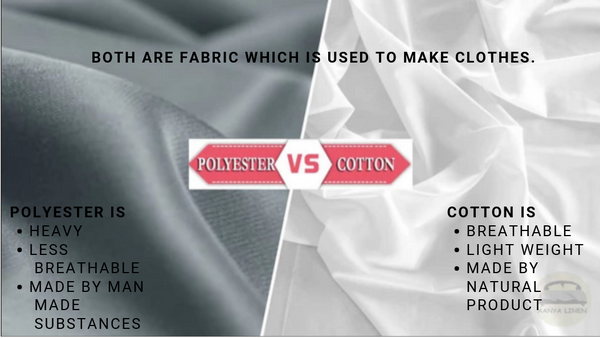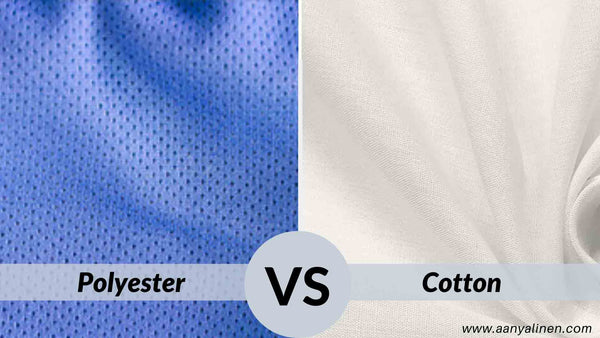You have no items in your shopping cart.
25
Jul
Polyester Vs Cotton
Polyester is heavy and less breathable and is made from man-made substances whereas cotton is breathable and lightweight natural fabric but both are the fabric that is used to make clothes. Polyester is synthetic and resists shrinkage but cotton is natural and doesn't resist shrinking and stretches. "Polyester vs cotton" is a great topic to learn about fabrics we are using in day-to-day life.
Polyester Vs Cotton | Comparison Chart
| Sr.No. | Polyester | Cotton |
|---|---|---|
| 1 | Synthetic | Natural |
| 2 | Heavy | Lightweight |
| 3 | Denser | Breathable |
| 4 | Durable | Less Durable |
| 5 | Allergenic | Skin Friendly |
| 6 | Resist Shrinkage | Shrinkage Takes Place |
People are becoming more conscious of things that impact their world. The populace, in general, is more in tune with sustainable and renewable products, so it has raised the question, “What about Polyester vs Cotton? What’s the difference?”. This is really a good thing that now people are thing about the nature and environment. We will explore the difference between these two materials 'polyester and cotton' in this article, so read on to find out and decide for yourself.

Polyester
Polyester is a synthetic fabric. It is not classified as ‘natural’ since polyester is made with chemicals and other man-made substances. Polyester is heavier and denser than cotton. It also tends to hold stains and dirt and is not as breathable or cool as cotton. One main difference between Polyester vs Cotton is its durability. Polyester is far more durable than cotton due to its chemical makeup. This is a double-edged sword in some respects as it does last literally forever, it does not break down in landfills and other composting facilities like cotton does. In other words, not only does it take man-made chemicals to make, but it also clogs up landfills since it does not decompose.
Cotton
Cotton is a natural product which grows on plants. It is also the most popular of the two fabrics when it comes down to polyester vs cotton. Cotton, by its very nature, is breathable, which means air can flow through it easily. It helps sweat to evaporate quickly and helps clothing and linens to stay fresh longer. Cotton also is naturally hypoallergenic, so that people who have contact allergies can safely wear this material without fear of a reaction. Most children and baby clothes are made with cotton. It is used more than polyester bed linens are also made with cotton as cotton sheets are the best sheets for hot sleepers.
Is polyester as comfortable as cotton?
Cotton is more comfortable comparing to polyester. Cotton offers optimal breathability and softness. Polyester is a fine choice for certain fabrics, but for maximum comfort and durability, cotton is the best for your everyday needs.
Is polyester or cotton better for hot weather?
Cotton fabric provides superior breathability, durability, and softness in hot climates. Its lightweight design wicks away moisture and keeps the body cool and sweat-free in even the hottest temperatures. Plus, cotton is naturally hypoallergenic and chemical-free, making it a safer option for sensitive skin.
Conclusion "Polyester vs Cotton"
Polyester vs Cotton has many points to consider. Textile companies mainly use cotton to make textile. This includes sheets, curtains, quilts, and blankets. Recently, cotton has also gained popularity with clothing makers but not just for children. Adults are beginning to see the value in this fabric. It also holds dye well and resists tears and stains. Cotton is hypoallergenic and naturally antibacterial. In other words, it will last well. It will help to keep you and your family healthy.
This will also help to keep the Earth healthy since it decomposes well and adds back to the Earth in a natural way. It does not take man-made chemicals to make this fine fabric, and it is also sustainable and renewable. In other words, cotton is the fabric of the present and the future. Which would you rather invest your hard-earned dollars into? While it may cost a bit more, the quality and advantages of this fabric far outweigh that of polyester. Well, It's all up to you but I can suggest to you another topic Rayon V/s Cotton that is also a good topic to be debated people are interested in that and they will be glad to hear your views.












← Older Post Newer Post →
Related Blogs
How to fall asleep quickly?
What is a Zero Gravity Bed?
What Colors are calming for a bedroom?
October Colors
September Colors
August Colors
July Colors
June Colors
May Colors
April Colors
February Colors
December Colors
Best Type of Sheets For Hot Sleepers
Difference Between Duvet and Comforter Covers
What is Polyester Used For?
Can You Iron Polyester Curtains?
Bedding Size Chart USA
What is a Duvet Cover Bedding?
How to Wash Satin Pillowcase?
How to Wash Satin Sheets?
How to Use a Pillow Sham?
How to Dry Bamboo Sheets
How to Wash a Weighted Blanket?
How to Dress a Bed?
How to Choose a Duvet Insert?
How to Sleep 8 Hours in 4 Hours
Breathing Problems While Sleeping
California King Sheet Size
How to Sleep On Your Back Properly?
Does Tencel Shrink?
King Bed Sheet Size
Queen Sheet Sizes in Inches and Centimetres
Belgian Linen Flax
Rash From Bed Sheets
TWIN BED SHEET SIZES
WHAT IS A BED SKIRT?
What is Round Sheet Set?
What is Beddings?
Cotton Fibers
Linen Vs Cotton
Cotton Vs Viscose
What is cotton Blend?
What is Split King Sheet
Does Rayon Shrink?
Can You Iron Polyester
1 comment
I’m not a fan of polyester, but I live in Australia and cotton is a very thirsty crop in a country where water is a big issue. Australia is the driest inhabited continent. Growing cotton doesn’t make sense here. How does importing cotton fabrics impact its sustainability rating? What else is better?